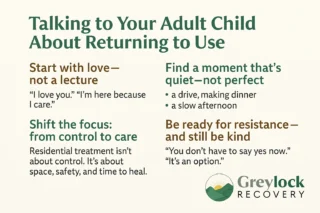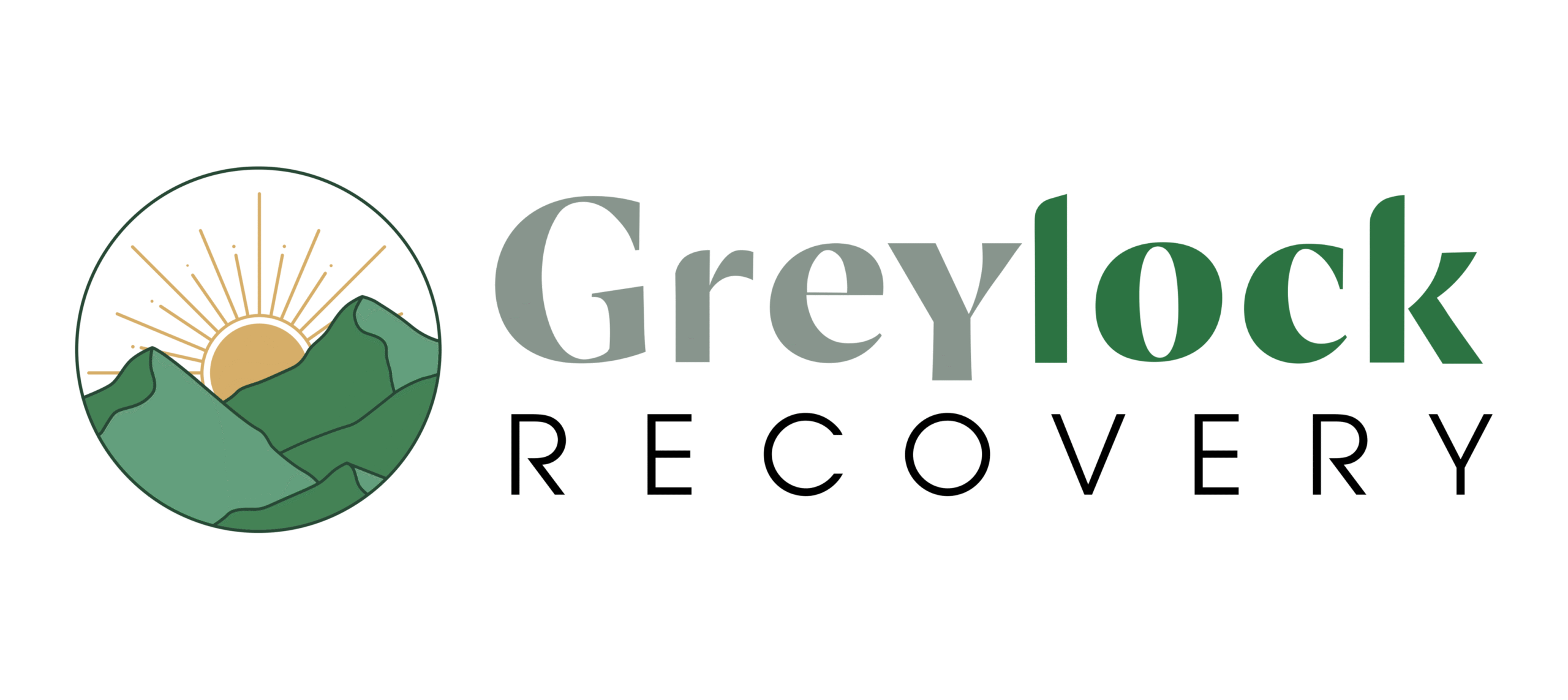There’s no script for this.
No perfect sentence.
No magic moment where you say the right thing and they nod and agree to go.
Because when your child is using again—after treatment, after promises, after everything—it doesn’t just hurt. It terrifies you.
And the last thing you want is to push them away by trying too hard to help.
If you’re walking that tightrope, you’re not alone. Many parents face the painful dilemma of how to bring up residential addiction treatment without triggering shutdown, rage, or retreat.
At Greylock Recovery in Williamstown, Massachusetts, we’ve supported families through this exact conversation. This blog won’t give you all the answers—but it will offer a path to speak with love, honesty, and hope.
Start With Love—Not a Lecture
Before you talk about treatment, talk about them.
Start with their worth, not their problem. Something simple and disarming like:
- “I love you. That hasn’t changed.”
- “I’m not here to lecture. I’m here because I care.”
- “I know things have been hard lately. I don’t have all the answers. But I’m here.”
Your child—especially if they’re in their 20s—may already feel defensive, ashamed, or misunderstood. Leading with love helps soften the edge of what’s to come.
This isn’t about convincing them. It’s about staying connected.
Find a Moment That’s Quiet—Not Perfect
You don’t need to wait for a rock bottom moment. But you do need to wait for a moment where they can hear you.
That might look like:
- A drive with no destination
- Making dinner together
- A slow afternoon where no one’s in crisis
Avoid starting the conversation mid-conflict or while they’re intoxicated. The goal is to open a door, not knock it down.
And if they shut it anyway? Try again another time.
This is a process. Not a performance.
Shift the Focus: From Control to Care
One of the biggest traps is talking about treatment like it’s punishment. Or discipline. Or fixing a “bad” behavior.
But residential addiction treatment in Massachusetts isn’t any of those things. It’s space. It’s safety. It’s time to breathe and stabilize.
Try framing it like this:
- “This isn’t about control. It’s about giving you a break from everything that’s hurting.”
- “You don’t need to be perfect to get help. You just need space to figure things out.”
- “I’m not asking you to change everything overnight. I’m asking if you’d be open to something different.”
That small shift—from control to care—can make the difference between a wall going up and a door staying open.

Let Them Keep Their Dignity
Even when you’re scared.
Even when it feels urgent.
It’s tempting to say things like:
- “You have to go, or you’re not staying here.”
- “I can’t watch you ruin your life.”
But while that might be how you feel—it lands like shame. And shame doesn’t change people. It buries them.
Instead, try:
- “This is your choice. And I respect that. But I want you to know what’s available.”
- “I know this conversation is hard. I’m not trying to force anything. I just want you to feel safe.”
Your child may be hurting, lost, or using—but they’re still an adult. And the more dignity you give them, the more likely they are to choose help on their own terms.
Know Enough to Offer, Not Overwhelm
Having facts helps—but don’t turn the conversation into a presentation.
You can gently offer:
- “There’s a place called Greylock Recovery. It’s here in Massachusetts. It’s not a hospital. It’s a residential program that helps people step back and heal.”
- “They don’t treat you like a number. And it’s not forever. Some people go for a month. Some longer. It’s just a place to stabilize.”
Having that core residential treatment page bookmarked is helpful. But lead with connection, not logistics.
You’re not selling something. You’re offering hope.
Be Ready for Resistance—and Still Be Kind
Your child might say:
- “I’m fine.”
- “I’m not doing that again.”
- “Treatment doesn’t work.”
They might lash out. Walk away. Roll their eyes.
It doesn’t mean the conversation failed.
Here’s what does matter: your response.
Instead of arguing, try:
- “You don’t have to say yes now. I just want you to know it’s an option.”
- “I get that. You’ve been through a lot. And you’re allowed to feel that way.”
That calm? That respect? That’s what makes them come back later. Maybe not today. But when they’re ready.
Normalize the Pain—Without Pretending It’s Easy
Sometimes, your child doesn’t need a push—they need permission.
Permission to be struggling. To be scared. To be unsure.
You can say:
- “What you’re going through isn’t rare. A lot of people go through this. You’re not broken.”
- “Needing help doesn’t make you weak. It makes you human.”
Let them know this isn’t about being “sick enough.” It’s about being tired enough to try something different. Even for a little while.
Take Care of You, Too
We say this with love:
You can’t hold your child together if you’re falling apart.
You deserve support, too. That might mean therapy, a parent group, or just asking a friend to sit with you after a hard conversation.
You’re not just “the parent.” You’re a human. And this hurts.
Greylock Recovery offers support for families because healing happens in circles—not just solo.
FAQs: Talking to Your Child About Residential Addiction Treatment
What is residential addiction treatment?
Residential addiction treatment is a live-in program where your child can safely detox, receive therapy, and rebuild structure away from daily triggers. It’s immersive, intensive, and often a turning point for those needing full focus on healing.
How do I know when it’s time to bring it up?
If your child is using again, struggling emotionally, isolating, or showing signs of relapse—it’s worth having the conversation. You don’t need a perfect moment. Just a calm one.
What if my child says treatment didn’t work last time?
Validate their experience. You can say:
“I believe you. Some places aren’t the right fit. But that doesn’t mean nothing can help. Greylock’s different. Can we look at it together?”
How long does treatment usually last?
Typical programs last 30 to 90 days, but it depends on your child’s needs. Greylock offers flexible plans with clinical support throughout.
What if I can’t afford it?
Greylock works with many insurance plans and offers guidance on financing options. Don’t assume treatment is out of reach—call and ask. You deserve to know what’s possible.
Can I be involved in their treatment?
Yes. Family involvement is often part of the healing process. At Greylock, families are supported and included in ways that help—not hinder—your child’s recovery.
What if they say no?
Then you try again another time. You keep the door open. You don’t stop loving them. And you remember: resistance is not rejection. It’s fear. And fear can shift with time, connection, and patience.
You Don’t Have to Get It Perfect—Just Keep Showing Up
There’s no single conversation that saves someone. But love, respect, and calm? They echo. They stick.
You can be the reason your child even considers a new start. Not because you pushed. But because you stayed soft—even when it hurt.
Call (413) 848-6013 to learn more about Residential Addiction Treatment services in Williamstown, Massachusetts. The version of your child that’s still in there? They’re worth meeting again.


